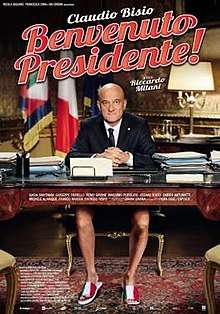Welcome Mr. President
Welcome Mr. President (Italian: Benvenuto Presidente!) is an Italian 2013 comedy film directed by Riccardo Milani and starring Claudio Bisio.[1][2][3]
| Welcome Mr. President | |
|---|---|
 | |
| Directed by | Riccardo Milani |
| Produced by | Nicola Giuliano Francesca Cima |
| Written by | Fabio Bonifacci Luca Miniero |
| Story by | Fabio Bonifacci Nicola Giuliano |
| Starring | Claudio Bisio Kasia Smutniak |
| Music by | Andrea Guerra |
| Cinematography | Saverio Guarna |
| Distributed by | 01 Distribution |
Release date |
|
Running time | 98 min |
| Country | Italy |
| Language | Italian |
Plot
Giuseppe Garibaldi is a modest librarian in a small town in Piedmont. He loves to read, transmit culture to children, despite the library's lack of funds, and river-fishing. Meanwhile, in Rome are held the elections of the President of the Republic, but political leaders can not reach an agreement. As a result, main party leaders all chose to vote for a historical figure as a protest vote: unintentionally they all end up electing "Giuseppe Garibaldi". When the vote is confirmed the party leaders are in shock and want to immediately nullify the vote: the only problem is that there is an eligible citizen with that same exact name, so by law he has to become president. That man is Giuseppe Garibaldi, the librarian-fisher. The party leaders want him to resign, but as Giuseppe understands the spreading corruption of Italian politics, he refuses. Once “Peppino” becomes president, he immediately notices the cruel world of Italian politics. Giuseppe, friend of the people, begins to do many good works, earning the popular support. Meanwhile, the leaders of the political parties try to impeach him.
Giuseppe, however, makes a poignant speech to parliament, putting all the politicians and the Italian public itself to ridicule. A few weeks later, Giuseppe is reached by a phone call in his small country: the Vatican made the same mistake electing the new Pope!
Cast
- Claudio Bisio as Giuseppe 'Peppino' Garibaldi
- Kasia Smutniak as Janis Clementi
- Omero Antonutti as General Secretary Ranieri
- Remo Girone as Morelli
- Giuseppe Fiorello as Center-right leader
- Cesare Bocci as Lega Nord leader
- Massimo Popolizio as Center-left leader
- Franco Ravera as Luciano Cassetti
- Gianni Cavina as Mr. Fausto
- Michele Alhaique as Piero Garibaldi
- Patrizio Rispo as General Cavallo
- Pietro Sarubbi as President of Brazil
- Piera Degli Esposti as Janis' Mother
- Gigio Morra as Spugna
- Pupi Avati, Lina Wertmüller, Steve Della Casa and Gianni Rondolino as the powers-that-be
See also
References
- Claudia Morgoglione (13 March 2013). "Saggio e naif, Bisio al Quirinale "Ma non chiamatemi grillino..."". La Repubblica. Retrieved 31 January 2016.
- Paola Casella (14 March 2013). "Bisio presidente in stile grillino tra comico e surreale". Europa. Retrieved 31 January 2016.
- i Luca Marra (17 May 2015). "Benvenuto Presidente!". International Business Times. Retrieved 31 January 2016.